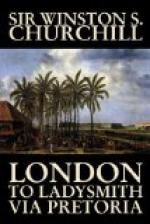The ceaseless marching and fighting had worn out the clothes and boots of the army, and a certain number of the guns of the field artillery were unserviceable through constant firing. The troops, besides clothes, needed fresh meat, an exclusive diet of tinned food being unwholesome if unduly prolonged. Sir Redvers Buller’s estimate that a week’s rest was needed does not seem excessive by the light of such facts, but still one more effort might have saved much trouble later on. On March 3 the relieving army made its triumphal entry into Ladysmith, and passing through the town camped on the plain beyond. The scene was solemn and stirring, and only the most phlegmatic were able to conceal their emotions. The streets were lined with the brave defenders, looking very smart and clean in their best clothes, but pale, thin, and wasp-waisted—their belts several holes tighter than was satisfactory.
Before the little Town Hall, the tower of which, sorely battered, yet unyielding, seemed to symbolise the spirit of the garrison, Sir George White and his staff sat on their skeleton horses. Opposite to them were drawn up the pipers of the Gordon Highlanders. The townsfolk, hollow-eyed but jubilant, crowded the pavement and the windows of the houses. Everyone who could find a flag had hung it out, but we needed no bright colours to raise our spirits.
At eleven o’clock precisely the relieving army began to march into the town. First of all rode Sir Redvers Buller with his headquarters staff and an escort of the Royal Dragoons. The infantry and artillery followed by brigades, but in front of all, as a special recognition of their devoted valour, marched the Dublin Fusiliers, few, but proud.
Many of the soldiers, remembering their emerald island, had fastened sprigs of green to their helmets, and all marched with a swing that was wonderful to watch. Their Colonel and their four officers looked as happy as kings are thought to be. As the regiments passed Sir George White, the men recognised their former general, and, disdaining the rules of the service, waved their helmets and rifles, and cheered him with intense enthusiasm. Some even broke from the ranks. Seeing this the Gordon Highlanders began to cheer the Dublins, and after that the noise of cheering was continual, every regiment as it passed giving and receiving fresh ovations.
All through the morning and on into the afternoon the long stream of men and guns flowed through the streets of Ladysmith, and all marvelled to see what manner of men these were—dirty, war-worn, travel-stained, tanned, their uniforms in tatters, their boots falling to pieces, their helmets dinted and broken, but nevertheless magnificent soldiers, striding along, deep-chested and broad-shouldered, with the light of triumph in their eyes and the blood of fighting ancestors in their veins. It was a procession of lions. And presently, when the two battalions of Devons met—both full of honours—and old friends breaking from the ranks gripped each other’s hands and shouted, everyone was carried away, and I waved my feathered hat, and cheered and cheered until I could cheer no longer for joy that I had lived to see the day.




